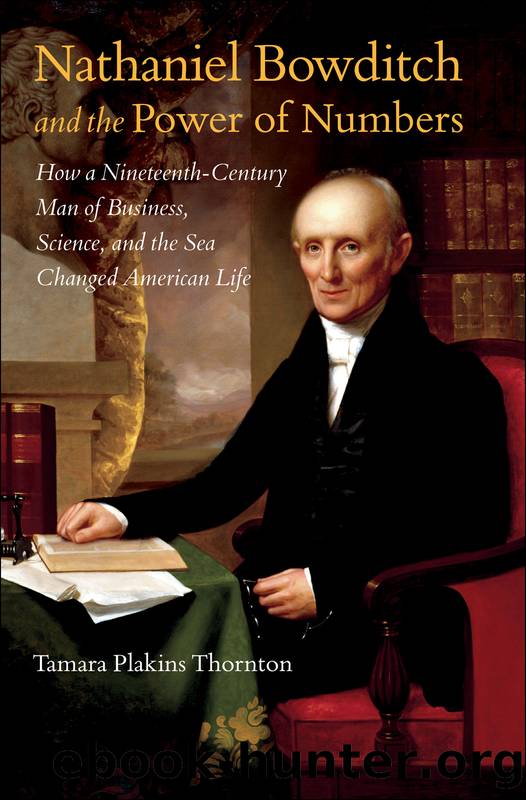Nathaniel Bowditch and the Power of Numbers by Tamara Plakins Thornton

Author:Tamara Plakins Thornton
Language: eng
Format: epub
Publisher: The University of North Carolina Press
Published: 2016-01-15T00:00:00+00:00
Chapter Nine: Apogee
In the last decade of his life Bowditch reached the height of his fame. The name âBowditchâ had long been synonymous with the maritime best seller. More recently, in Boston, it had attached itself to what was known simply as the âBowditch Office.â But by the 1830s Americans everywhere recognized Bowditch as their nationâs very own mathematical genius. To establish the impossibility of one particular mathematical problem, a Washington newspaper explained that âMr. Bowditch himselfâ would not be able to solve it. A short story in a New York paper featured a character who, knowing âno more about ciphering than the man in the moon,â generates a problem âwhich would have puzzled Mr. Bowditch himself.â Another story, this one written for children, had a similar character who âhad conquered a sum in Mathematics, that would have puzzled Bowditch.â1 Why the rise in fame? Between 1829 and 1839 Bowditch published the four volumes of his magnum opus, his massive translation of Laplaceâs Mécanique Céleste. It seemed to solidify his reputation for all time.
It certainly was about time. Already partial English translations were appearing. Although these were incomplete, and the commentary was nowhere near as learned or detailed as his own, Bowditch may have worried about getting scooped. Meanwhile, Laplace published a fifth volume and then died soon after, in 1827. There would be no changes to the first four volumes as Bowditch had anticipated. So in 1828 Bowditch initiated the process of putting his manuscript into print. I waited âtill I could afford to publish it at my own expense,â he told his minister, and that time has âat last arrived; and if, instead of setting up my coach, as I might have done, I see fit to spend my money in this way, who has any right to complain?â When he told Mary the project would cost $10,000âit would actually cost $12,000 âshe told him she would make any sacrifice necessary.2
As the four volumes were published, they made their way to readers in the United States and Europe, even as far away as India, through a personal network of booksellers, merchants, and fellow men of letters. The response was gratifying. Prominent British and Continental scientists sent letters full of praise, and yet more European learned societies honored Bowditch with membership. Henry reported from Paris and London that his surname was a passport to learned circles. A discerning eye would have noted that Europeans shied away from celebrating Bowditch as an original thinker and focused instead on the sheer size and utility of the task he had undertaken. How wonderful, they wrote, that an American of all people should have translated Laplace. If he was aware of the condescension that tinged the praise, Bowditch did not let on, and his countrymen were certainly deaf to it. As far as they were concerned, those haughty Europeans had been upstaged by their American Newton.
Bowditch had other reasons to feel a sense of accomplishment. As his children came of age, they prospered. Networks of family and friends smoothed their paths as they had his own, but there was a difference.
Download
This site does not store any files on its server. We only index and link to content provided by other sites. Please contact the content providers to delete copyright contents if any and email us, we'll remove relevant links or contents immediately.
| China | India & South Asia |
| Japan |
Fanny Burney by Claire Harman(26597)
Empire of the Sikhs by Patwant Singh(23072)
Out of India by Michael Foss(16848)
Leonardo da Vinci by Walter Isaacson(13316)
Small Great Things by Jodi Picoult(7121)
The Six Wives Of Henry VIII (WOMEN IN HISTORY) by Fraser Antonia(5496)
The Wind in My Hair by Masih Alinejad(5091)
A Higher Loyalty: Truth, Lies, and Leadership by James Comey(4951)
The Crown by Robert Lacey(4806)
The Lonely City by Olivia Laing(4798)
Millionaire: The Philanderer, Gambler, and Duelist Who Invented Modern Finance by Janet Gleeson(4465)
The Iron Duke by The Iron Duke(4349)
Papillon (English) by Henri Charrière(4262)
Sticky Fingers by Joe Hagan(4188)
Joan of Arc by Mary Gordon(4100)
Alive: The Story of the Andes Survivors by Piers Paul Read(4018)
Stalin by Stephen Kotkin(3956)
Aleister Crowley: The Biography by Tobias Churton(3634)
Ants Among Elephants by Sujatha Gidla(3460)
